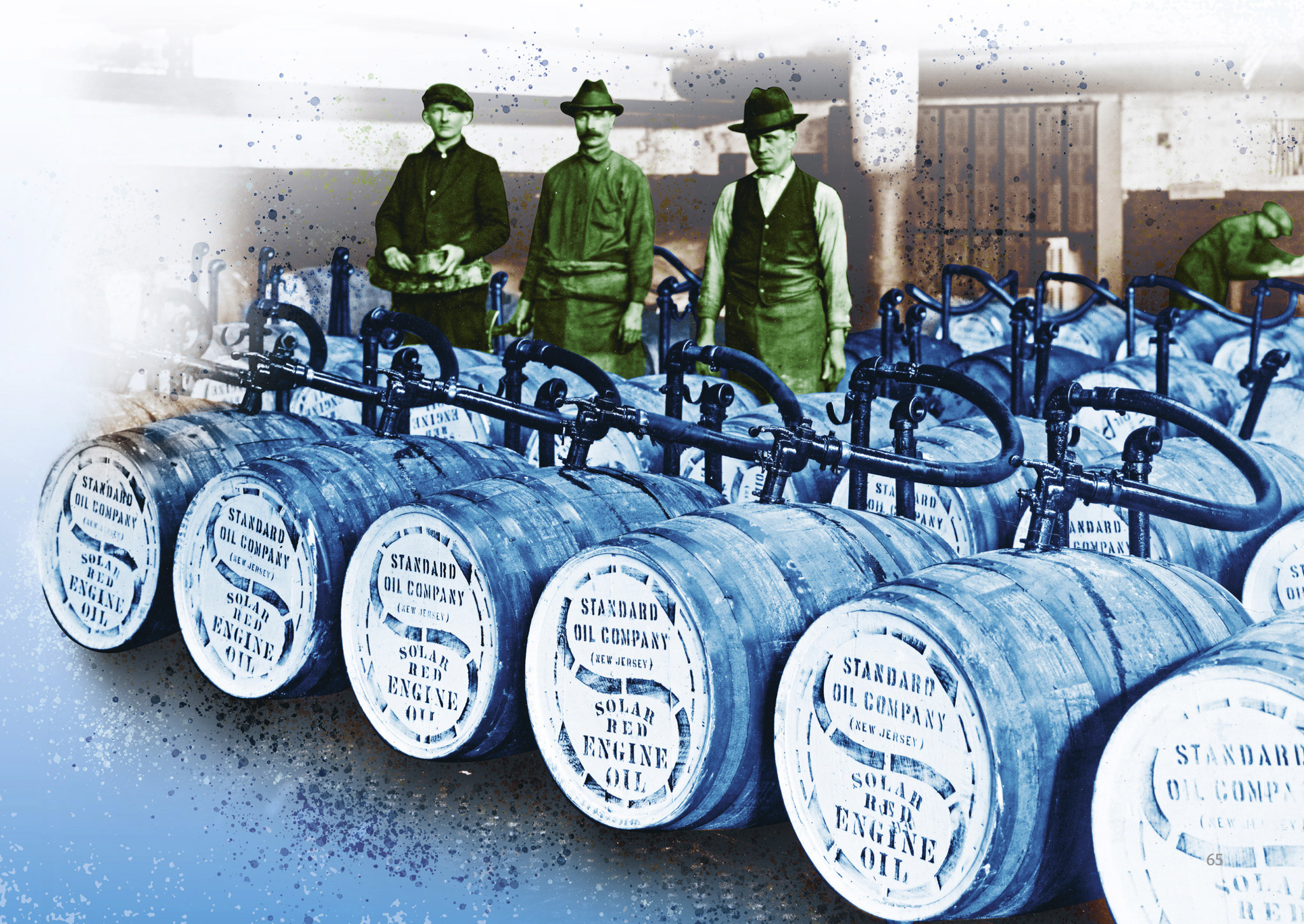
JOHN D. ROCKEFELLER
1839–1937
American industrialist John D. Rockefeller made a fortune from refining oil—his Standard Oil Company became one of the largest and most successful businesses in history. It gained such a monopoly that it led to the passing of antitrust laws at the end of the 19th century.
Born in New York in 1839, John Davison Rockefeller was a hard worker from the start, with a single-minded focus on wealth. Some attribute this to his troubled upbringing; his father was a traveling salesman, swindler, and bigamist, and the family lived in poverty. From a young age, Rockefeller started making money from various ventures and secured his first office job, aged 16, as an assistant bookkeeper at a produce shipping company. Within four years, he had started his own business with a partner, Maurice Clark, and set up as a merchant selling hay, meats, grains, and other goods on a commission basis.
Oil rush
Productive oil wells had been established in Pennsylvania in the early 1860s, and Rockefeller saw his opportunity to become a part of the booming oil business, providing a cheaper fuel than whale oil for lighting: kerosene. He built his first oil refinery in Cleveland in 1863, the largest in the area. By 1870, he had formed the Standard Oil Company and soon began to buy out his more cautious business partners and competitors at greatly discounted rates in a bid to create an oil monopoly. No blood was spilled in what Rockefeller’s opponents called the “Cleveland Massacre,” but in 1872, by which time the company controlled nearly all the refineries in Cleveland, Rockefeller was able to negotiate very favorable transportation rates for his oil with the railroad companies, allowing him to keep his oil prices lower than his competitors.
Rockefeller went on to buy up oil pipelines, oil terminals, and competing refineries in other cities. He set up the Standard Oil Trust, with himself as head, and dominated the oil industry across the US, with a near monopoly by 1882. Some admired his business skills, but many disliked how he undercut, or bought out, smaller oil companies and regarded him as a robber baron.
The Standard Oil Trust soon became a target for journalists and politicians. The US Congress ruled, with the Sherman Antitrust Act in 1890, that Standard Oil was a monopoly, and although Rockefeller dismantled the Trust, it essentially continued as a web of different companies, with Rockefeller expanding into the iron ore industry, including transportation, and acquiring more oil businesses. In 1909, spotting a loophole in the law in New Jersey, Rockefeller and his son, who was now involved in the business, recreated the Trust as a single holding company.

The California entity of Rockefeller’s Standard Oil Company produced its own monthly magazine to explain its business operations and plans to shareholders, employees, and the general public.
Business split
The exposure of Rockefeller’s ruthless business practices by a tenacious journalist named Ida Tarbell eventually led to the breakup of Standard Oil. In 1911, the press was full of the story as the massive corporation was split into 34 separate companies. Rockefeller was already considering retirement and the dispersal of some of his fortune. He was a devout Baptist and, around the turn of the century, had begun to focus his attention on philanthropy. He founded major US institutions, including the Rockefeller Institute for Medical Research in 1901 (now Rockefeller University), and the Rockefeller Foundation in 1913. By the time of his death, aged 98, in 1937, Rockefeller had given away more than $500 million.


Employees are seen here filling barrels with engine oil for shipment at the Standard Oil Company’s refinery in New York.
“It is a religious duty to get all the money you can, fairly and honestly; to keep all you can, and to give away all you can.”
John D. Rockefeller, 1928
FRIEDRICH ENGELHORN

German industrialist Friedrich Engelhorn founded the chemical production giant BASF.
Initially a goldsmith, Engelhorn (1821–1902) began manufacturing and distributing gas in Mannheim in the 1850s. The discovery that synthetic dyes could be made from tar—a by-product of producing gas from coal—inspired him to set up a business making both tar and aniline dyes. In 1865, this became Badische Anilin- & Sodafabrik (BASF). Now a vast multinational, it operates in more than 80 countries with aniline dyes still in its portfolio.
“WHO IS THE POOREST MAN IN THE WORLD? … THE POOREST MAN I KNOW OF IS THE MAN WHO HAS NOTHING BUT MONEY; NOTHING ELSE IN THE WORLD UPON WHICH TO DEVOTE HIS AMBITION AND THOUGHT.”
John D. Rockefeller
Address to Fifth Avenue Baptist Church, 1897

▲ A Standard Oil Company refinery, with pipelines segregating crude oils from different US oil fields, 1942.
MILESTONES
LEARNS BOOKKEEPING
Is apprenticed at a shipping company in 1855, aged 16, after taking a short business course.
STARTS BUSINESS
Sets up his own commission merchant business in 1859, grossing $450,000 in the first year.
MOVES INTO OIL
Constructs first oil refinery in Cleveland in 1863; buys out his business partners in 1865, gaining total control.
DOMINATES US OIL
His Standard Oil Company refines about 90 percent of all the oil in the US by 1882.
